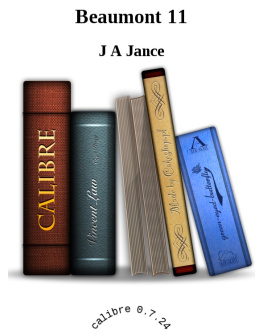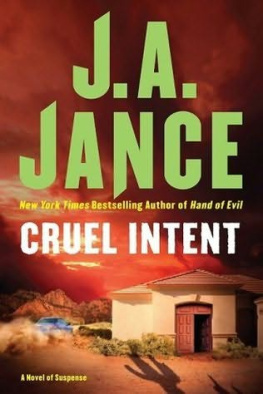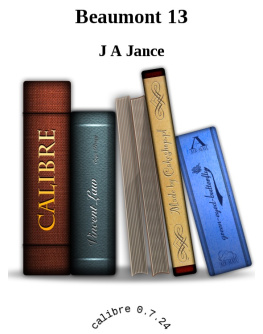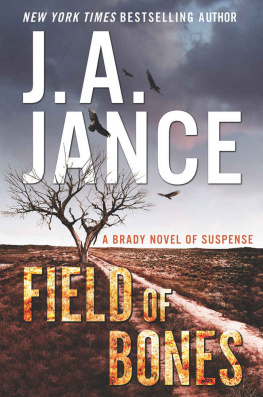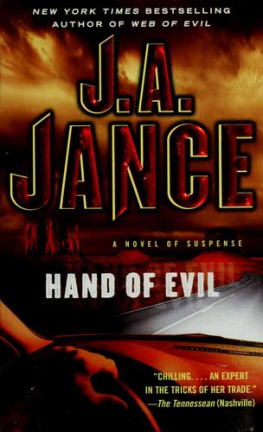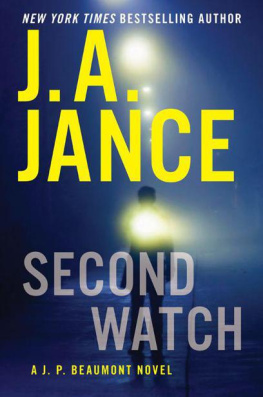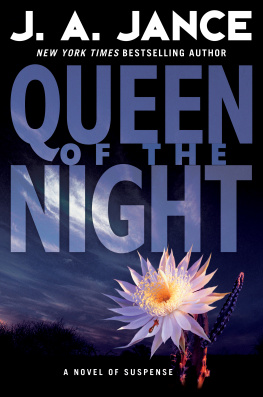J.A. Jance - Failure to Appear
Here you can read online J.A. Jance - Failure to Appear full text of the book (entire story) in english for free. Download pdf and epub, get meaning, cover and reviews about this ebook. year: 1994, genre: Detective and thriller. Description of the work, (preface) as well as reviews are available. Best literature library LitArk.com created for fans of good reading and offers a wide selection of genres:
Romance novel
Science fiction
Adventure
Detective
Science
History
Home and family
Prose
Art
Politics
Computer
Non-fiction
Religion
Business
Children
Humor
Choose a favorite category and find really read worthwhile books. Enjoy immersion in the world of imagination, feel the emotions of the characters or learn something new for yourself, make an fascinating discovery.
- Book:Failure to Appear
- Author:
- Genre:
- Year:1994
- Rating:5 / 5
- Favourites:Add to favourites
- Your mark:
- 100
- 1
- 2
- 3
- 4
- 5
Failure to Appear: summary, description and annotation
We offer to read an annotation, description, summary or preface (depends on what the author of the book "Failure to Appear" wrote himself). If you haven't found the necessary information about the book — write in the comments, we will try to find it.
Failure to Appear — read online for free the complete book (whole text) full work
Below is the text of the book, divided by pages. System saving the place of the last page read, allows you to conveniently read the book "Failure to Appear" online for free, without having to search again every time where you left off. Put a bookmark, and you can go to the page where you finished reading at any time.
Font size:
Interval:
Bookmark:
J.A. Jance Failure to Appear
FAILURE TO APPEAR
Ralph Ames, my attorney, followed me outside. He glanced in my direction but left me alone. Instead, he walked over to the other pair of worried people, the one made up of Karen, my ex-wife, and her present husband, Dave Livingston. As Ralph spoke to them, I noticed that, periodically, Dave would reach over and pat Karen's shoulder of pull her close and let her lean against him. Karen isn't the "helpless female" type, not by a long shot, but she was taking it hard. Real hard. I was thankful she had Dave there to lean on when she needed it. I could have had someone with me as well if I hadn't been so damn stubborn. Alexis Downey was willing. In fact, she had offered to come outside with me, but I had sent her back into the waiting room to stay with Jeremy. He needed someone there with him, too, and God knows I wasn't it. How could I possibly comfort him when I could barely stand to look him in the eye? Ashland Community Hospital. Why did this have to happen here in a little Podunk town like Ashland, Oregon? I fumed for the hundredth time. Why couldn't it have been in a big city like Portland or Seattle? Someplace civilized, where the number of high-tech doctors outnumber high-priced lawyers. Someplace where, in spots like Seattle's Pill Hill, glass-and-concrete hospitals stand cheek by jowl, stuck so close together that you can walk from one to another in a driving rainstorm without ever wetting your feet. I had suggested hiring a helicopter to fly Kelly to Portland, but the doctor nixed that idea. He shook his head and said there wasn't time. Not for either one of them. Alexis stepped outside then, too. With the highlights in her auburn hair gleaming in the afternoon sun, she walked over to where Ralph Ames stood huddled with Dave and Karen. The murmur of their conferring voices carried through the still, hot air even as far as my standoffish bench. If I had tried, I suppose I could have made out what they were saying, but the way I felt, not knowing was better than knowing. Ignorance may not be bliss, but at least it allowed a slim margin for hope. I glanced down at my watch. Two-thirty. The minister, a determinedly cheerful woman from the yellow Unity Church, had spent the better part of an hour at the hospital, sticking closer to Jeremy than to anybody else. Now she had gone off to Lithia Park to make sure all the guests knew the wedding had been canceled due to lack of a bride rather than lack of interest. I saw Alex turn toward me, her eyes questioning, but I ignored her. I didn't want to talk to anybody right then, not even Alex. In my case, misery most definitely does not love company. Coward that I am, when she started toward me, I abandoned the bench and beat it down the hill. For what seemed like hours, I wandered aimlessly through Ashland's boiling midday heat, thinking about the unlikely chain of events that had conspired to bring us all here together. As I walked, I brooded. I wondered if, after all this was over, anything would ever again be the same. carried through the still, hot air even as far as my standoffish bench. If I had tried, I suppose I could have made out what they were saying, but the way I felt, not knowing was better than knowing. Ignorance may not be bliss, but at least it allowed a slim margin for hope. I glanced down at my watch. Two-thirty. The minister, a determinedly cheerful woman from the yellow Unity Church, had spent the better part of an hour at the hospital, sticking closer to Jeremy than to anybody else. Now she had gone off to Lithia Park to make sure all the guests knew the wedding had been canceled due to lack of a bride rather than lack of interest. I saw Alex turn toward me, her eyes questioning, but I ignored her. I didn't want to talk to anybody right then, not even Alex. In my case, misery most definitely does not love company. Coward that I am, when she started toward me, I abandoned the bench and beat it down the hill. For what seemed like hours, I wandered aimlessly through Ashland's boiling midday heat, thinking about the unlikely chain of events that had conspired to bring us all here together. As I walked, I brooded. I wondered if, after all this was over, anything would ever again be the same. It had started only three days earlier, although now that seemed a lifetime ago. It began with a ringing telephone and with me cursing the noisy instrument that I regard as technology's worst blight on the human race. Telephones follow me everywhere. Even in my car. There is no escape. The blaring phone jarred me to my senses sometime around seven o'clock on a drizzly Saturday morning toward the end of June. Friday night had been a late one. I wasn't nearly ready to rise and shine, but homicide cops at Seattle P.O. are used to unscheduled, early-morning wake-up calls. Around what locals call the Emerald City, people tend to knock each other off in the middle of the night or in the wee small hours of the morning, especially right after the bars close on weekends. If the work load gets too heavy for the regular night-duty squad to handle, they start calling for reinforcements. Being off-duty doesn't mean you're home free. When your name comes up on the rotation, you're called and you go in, regardless of what you may or may not have been doing the night before. Having a personal life is no excuse. I figured my early-morning phone call meant it had been another one of those busy Saturday-night-special Friday nights around Seattle P.D. "Beaumont here," I grumbled into the phone, wishing we could somehow convince the city's crooks-the gangs, the thugs, and the variously affiliated drug dealers-to use each other for target practice during regular daytime eight-hour shifts. "What's up?" "This is Dave," an unfamiliar male voice replied. "You know, David Livingston?" I was still muffled in a warm, sleep-induced cocoon, and this joker had me stumped. I could have sworn I didn't know anyone in the whole wide world by the name of David Livingston. The telephone must have passed along my blank silence, because a moment later good of' Dave gave me a helpful hint. "You may not remember, but we met once, a while ago, down in Wickenburg, Arizona. I don't think we were ever properly introduced." Jump-started now, the old brain finally fired and caught hold. Of course! ThatDave Livingston. My ex-wife's second husband. No wonder I didn't recognize him! I sat up a little straighter in bed. Of all people, what did Dave Livingston think he was doing calling me up? So early on an otherwise peaceful Saturday morning that I had not yet tasted a single sip of coffee, here was Dave, already up and about and letting his fingers do the walking. In a universe full of complicated matrimonial merry-go-rounds, second husbands don't often reach out and touch first husbands. By telephone, that is. It isn't done. Not unless it's a dire emergency-a matter of life or death or missing child support. We're all reasonable adults, but there is a limit. Now, though, I heard Dave, talking to me as calmly as if conversations between us were an everyday occurrence. Since child support has never been a source of controversy, my mind leaped instantly to all the other worst possible conclusions. "Dave," I croaked. "What is it? Karen?" He paused a moment and cleared his throat. "No, not Karen." "The kids then?" I said "kids" aloud, but even as I said the word, I knew it was a lie. I have fathered two offspring-Scott and Kelly. Scott, my firstborn, is as steady and responsible a kid as any parent, good or otherwise, has any right to hope for or expect. He's never given any of us-Dave Livingston included-a moment's trouble. Kelly is something else, our collective problem child- a wild haired, pain-in-the-ass-type kid who started wearing makeup and testing limits at the tender age of eleven and has been off the charts ever since. She had run away from her stepfather's home in Cucamonga, California, some four months earlier, disappearing one week shy of her eighteenth birthday and several months short of high school graduation. Once Karen finally saw fit to tell me what was going on, I had hired an L.A.-based private investigator to look into Kelly's disappearance. All he had sent me so far was an outrageous bill. "Kelly then," I added. "Did you find her?" "Sort of," Dave Livingston allowed gloomily. "More or less." For a supposedly hotshot accountant, Dave was being damnably nonspecific. Meanwhile, my homicide cop's mentality was working overtime, filling in the most gruesome kinds of missing-person details-the dry ravines where unsuspecting people sometimes stumble over vulture-scattered human remains. Memories of long-overlooked and rotting corpses loomed in my mind's eye. Unfortunately, cops have chillingly realistic imaginations. We've seen it all. More than once too often. "Tell me then, for God's sake!" I urged. "What the hell do you mean, 'more or less'? Is she alive or not? And if she's alive, is she all right?" "I haven't talked to her yet," Dave put in quickly. "Not in person; neither has Karen. As a matter of fact, Karen knows nothing about all this. She was so bent out of shape when Kelly ran away that I didn't exactly tell her I was hiring a detective." Great minds think alike. So Dave and I had both hired private eyes. His had gotten results. I'd have to fire mine. "So where is she?" I prompted. "Is she okay?" "In a little town in southern Oregon. A place called Ashland. Ever heard of it?" I had heard of it, as a matter of fact. Months earlier, the town of Ashland had been nothing more than a green-and-white freeway exit on 1-5, the last stop in Oregon before hitting the California border. Now, thanks to my new friend Alexis Downey, the director of development for the Seattle Repertory Theater and the lady with whom I had spent most of the previous evening, I knew a whole lot more than I would have otherwise. From listening to Alex, as she likes to be called, I knew that the Oregon Shakespeare Festival in Ashland has, over the last fifty-some-odd years, created a multimillion-dollar business out of doing Shakespearean reruns every summer. In Ashland the Bard of Avon translates into big business. People come from all over the country year after year to see the seven or eight plays that run concurrently in three separate theaters. Because of increasingly stiff competition for regional arts dollars, Alex Downey keeps a close eye on all the theaters on what she calls "the 1-5 route." She had even suggested that we might want to skip down to Ashland for a romantic weekend once over the summer to take in a couple of plays, all in the name of knowing what "everybody else is doing." At the time Alex mentioned it, a trip to Ashland had sounded like a treat-your basic roll in the hay with a dollop of culture thrown in for good measure. Now, that selfsame Shakespearean weekend didn't seem like nearly such a good idea. The thought of running into my daughter on the streets of Ashland threw a real wet blanket on my fantasies of sexual/cultural adventure. Call me a prude if you will, but I didn't want to give my already headstrong daughter any bright ideas that she might not think up on her own. "What's Kelly doing there?" I asked. "Acting?" When she was little, that's what Kelly always said she wanted to be when she grew up-an actress. In high school she had played major roles in several school productions, but by then her mother and I were divorced. I never actually saw her perform onstage. My experience with Kelly's acting capability came primarily from being on the receiving end of emotional temper tantrums whenever the two of us wound up in a nose-to-nose confrontation. High-powered theatrics aside, I didn't regard acting as a realistic career choice. All little girls can't become actresses any more than millions of little boys can all grow up to be cops or firemen. "Hardly," Dave answered. "She's working as a hotel maid and doing some baby-sitting on the side." Baby-sitting was no surprise. All her life Kelly had been exceptionally good with little kids, but I couldn't imagine her working as a maid. Neither could anyone who had ever seen her room. Incredible irony-that's what Mrs. Reeder, the beautiful woman who taught my senior English class at Ballard High School, would have called it. Kelly is the only person I've ever met who can totally trash any given room within fifteen minutes of entering it. On the odd occasion when she's stayed with me in Seattle, I've watched her make a shambles of my whole apartment in far less time than it takes to say, "When's dinner?" "Kelly, a maid?" I choked. "You've got to be kidding." I did my best to stifle a relieved chuckle, but Dave Livingston was not amused, and he wasn't laughing, either. "I'm not kidding," he returned doggedly. "And I'm not making this up. I just found out. She plans to get married sometime early next week." That got my attention. "Hold it! Did you say married? She can't do that. She's only eighteen years old, for Chrissakes. And she hasn't done a damn thing about getting her education." "I know," Dave agreed. "I was hoping you could go down there and maybe talk some sense into her thick skull." "Karen's way better with her than I am. Has she tried?" "Like I said," he confessed uneasily. "I haven't exactly told Karen about this. She was upset enough to begin with. When she hears what's going on now, she'll go crazy." Dave had a point-a good one. Once or twice I've had the misfortune of being in close proximity to Karen Moffit Beaumont Livingston when she's busy kicking ass. It isn't a pretty sight. Karen is a lady who knows how to indulge in histrionics. By comparison, Kelly is a rank amateur. Wide awake now, I sat up and groped on the night stand for pencil and paper. "Who's the boyfriend?" I asked. "His name's Jeremy Todd Cartwright, the Third," Dave answered. "Sounds impressive. What does he do?" "I've got a short bio right here. It says he's a part-time actor and musician. Up in Ashland this season he's in something called the 'Green Show." He plays a character called 'The Laredo Kid' in a play called The Majestic Kid,and he's 'servant' in Taming of the Shrew." I might have known-an actor. Talk about music to a future father-in-law's ears. I could already visualize the flaky son of a bitch. Long, greasy hair. At least one earring. Maybe even a single tasteful diamond chip in one side of his nose. But then I forced myself to look on the bright side. If Dave's bio information came from a current playbill, Kelly's intended was at least working. He had a job. From what I know about actors, that's highly unusual in and of itself. "Great. Do you have an address for this boy genius?" I asked, sitting there with my bare feet on the carpeted floor and with pencil poised over paper. "As a matter of fact I do," Dave Livingston answered. "One-forty-six Live Oak Lane-the same as Kelly's." The pencil lead snapped off as I wrote down the address. I wasn't upset. Not much. "So will you go see her?" Dave asked, almost pleading. "I need to hear what she has to say for herself before I tell Karen. I'll give you my work number so you can call me here. It's the end of the fiscal year. I'll be working off and on all weekend. If you don't mind, I'd rather Karen didn't find out I've gone behind her back on this." I can only describe it as one of life's supremely surrealistic moments, finding myself involved in an underhanded plot with my ex-wife's second husband, both of us scheming together behind Karen's back. But then, that's what makes life interesting-those little unforeseeable surprises. I took down Dave's work telephone number at the chicken-raising conglomerate in Rancho Cucamonga where he was the chief financial officer. "How soon will you go?" Dave asked. "That depends," I told him, "on how soon I get off the phone." With that, we hung up. After a quick detour to the kitchen to start a pot of Seattle's Best Coffee in my Krup's coffeepot with its thermal carafe, I headed for the shower. I figured I could go a long way in my little red Porsche on a full tank of gas with a full pot of coffee along for the ride. While I showered, though, reality set in. Alex and I were supposed to have dinner together that evening, and Ralph Ames, my attorney from Phoenix, was scheduled to arrive on Sunday afternoon. Once out of the shower, I called Ralph first. He's an early riser. Alex isn't. Ralph listened quietly while I brought him up-to-speed. When I finished my tale of familial woe, Ralph's reply was infuriatingly unflappable and lawyerly. "What's the plan?" he asked. "What do you think? I'm going to drive down, tell Kelly how the cow ate the cabbage, and put her on the first plane home." Ames cleared his throat. "That's not exactly realistic, is it, Beau? What if she won't go?" "Won't go?" I echoed. "Of course she'll go. She's just like me, stubborn as all get-out, but she'll listen to reason. She has to." "Not necessarily. If she's planning a wedding for next week, she may have decidedly different thoughts on the matter. After all," he added, "she is eighteen, you know." "I don't care how old she is. She may be eighteen, but she doesn't have the sense God gave little green apples." Ralph Ames and I have these kinds of disagreements all the time. He came on the scene at approximately the same time that Anne Corley, my second wife, shot through my life like some brilliant, sky-illuminating meteor. The profound impact she had on me is totally out of proportion to the amount of time the two of us actually spent together. When she died, she left me with more money than I know what to do with. Along with the money came Ralph Ames, who serves as general overseer of not only the money, but also of me. Through the years, and despite our somewhat divergent views, I've come to value both his unwavering friendship and his innate good sense. We argue from time to time, but more often than not I end up paying attention to what he says and doing things his way. "Don't you still have some use-it-or-lose-it-type vacation time coming to you?" he asked me after a slight pause. When Ralph asks a question, he usually does so in the same way most good detectives do-knowing, before he ever opens his mouth, exactly what the right answer should be. "You know I do," I returned irritably. "We talked about it last time you were here." "So why not take some time off? See if you can schedule vacation for all next week," he suggested. "That way, if it's possible to bring Kelly around, you'll have more time to make it work. If you drive down today and come right back tomorrow, you'll be under a tremendous amount of pressure. So will she." "And what if I can't make it work?" I growled, tweaked by Ralph's irritating and unreasonable reasonableness. "Look on the bright side," Ralph returned cheerfully. "That way, you'll be there in time for the wedding." Count on Ralph to discover some remote silver lining. "Whatever you decide," he continued, "I'm still planning on coming to Seattle tomorrow. Let me know if there's anything I can do. And say hello to Alex for me when you see her." "Right," I said. "She's the next person on my list to call. I'll give her your regards." I waited until I was seated in my leather recliner and drinking coffee before I dialed Alexis Downey's number. Middle-aged dating is hell. First you have to sort through what's out there to see if there's anyone you like who might possibly like you back. Do that, and things become even more complicated. In the past two months, I had discovered a good deal to like about Alexis Downey. There were also more than a few stumbling blocks-a major one being her huge, man-hating tabby cat named Hector. Another is her bed. Alex prefers to sleep on one of those crazy futon things, which she folds up into an unusable couch by day and turns into an equally uncomfortable bed by night. She insists my king-size Posturepedic mattress hurts her back. So we spend time together, quite a bit of it, actually-fun, enjoyable time-but one or the other of us is always creeping home to our respective beds in the middle of the night. From a neutral-mattress perspective, a trip to Ashland might have been fun, but not now, not with Kelly living there. Once I had Alex on the phone, I tried explaining to her exactly why I was on my way to Ashland by myself, why a joint trip seemed totally out of the question. At least to me. Alexis Downey had her own thoughts on the matter. "Like hell," she declared heatedly. "If you're going, so am I." "But what will I tell Kelly about you?" I asked. "What do you think you'll tell her? Your sex life is none of Kelly's damn business, that's what. How soon are we leaving?" After years of Fuller Brush training, I recognize assumed closes when I hear them even though I'm not always quick-footed enough to dodge out of the way. Alexis didn't ask whether or not she was invited. All she wanted was an estimated time of departure so she'd know how long she had to pack. "Can you be ready in forty-five minutes?" I returned. "No problem. I'll farm Hector out with Helen upstairs. Then I'll call my friend Denver down in Ashland and get her working on rustling us up a room and some play tickets. At the last minute, tickets may be damned hard to come by." "Denver?" I said. "You have a girlfriend named Denver?" "Denver Holloway. Didn't I ever tell you about her? She's directing at the Festival this year. If anybody can get rush tickets, she can." Advancing age has increased my ability to give in gracefully. "I'll be there at eight o'clock sharp," I told her. After that I called Sergeant Watkins, the desk sergeant on the homicide squad, and filled him in. Watty wasn't thrilled by my last-minute scheduling of vacation time, but he understood. He and I share the misfortune of being fathers to troublesome adolescent daughters. His youngest had married some two months earlier. Watty was well aware that I'd been worried about Kelly. He was one of the few people at the department who knew I'd hired a private eye. "Good luck on straightening Kelly out," he told me, "but I'm betting you won't be able to change her mind one iota. As far as I'm concerned, boys are a hell of a lot easier to raise. With boys, you only have to worry about one penis. With girls, you have to worry about all of them." His helpful, fatherly comment didn 'I improve my frame of mind. "Thanks for all the encouragement, Watty. I needed that." I could hear him grinning into the telephone. "Always glad to be of service," he said. I slammed down the receiver. The Automobile Association of America says it's a ten-hour drive from Seattle to Ashland averaging fifty miles an hour. I didn't drive Triple A's recommended fifty. I threw a hastily packed suitcase into the 928, gassed up, and collected Alex from her condo on Queen Anne Hill at eight on the dot. Once on 1-5,1 tucked the Guards red Porsche in with the crush of fast-moving southbound traffic and stayed in the middle of the pack. Fortunately, Alexis Downey isn't a backseat driver. She doesn't have to get out of the car every mile or two, either. With short but necessary pit stops in Portland and Roseburg, we turned off the freeway into Ashland at 4:45 that afternoon. As we headed south, steady rain gradually gave way first to drizzle and then to occasional showers. While we were passing through the Siskiyous, partly cloudy blue skies appeared overhead. By Medford, it was full-fledged summer, but I didn't notice. I was far too distracted to enjoy what should have been a pleasant, scenic drive. Preoccupied with thoughts about Kelly, I'm sure I wasn't much of a travel companion to Alex. Kelly had been missing from home for almost four months. I should have been overjoyed that Dave had located her. But I'm a cop in what I call the Nasty Nineties. I've seen what happens to runaways who take to living on the streets for even as short a period of time as a few weeks. I've witnessed the heartbreaking aftermath when anxious parents, thinking they're getting their kid back, come downtown to pick up the pieces. Or else to identify a body. With all the stuff that's out on the streets now-drugs, AIDS, herpes, gang warfare- even if the kid isn't dead, what the parents get back isn't the same person who left home a few days or weeks or months earlier. Fortunately, Alex is a very patient woman. For most of the way, she left me alone, but finally even she could no longer tolerate the thick, oppressive silence. "Have you decided what to do?" she asked. "Murder's out," I replied glumly, "for professional reasons if nothing else." She laughed. "No. Seriously, Beau, what options do you have?" "How about offering him a bribe, sort of a reverse dowry? Maybe Jeremy Todd whatever-his-name-is has heard through the grapevine that I'm supposed to be loaded. It wouldn't surprise me if he's only in it for the money. Kelly has lousy taste in men." "Getting married isn't exactly the end of the world," Alex argued. "Some of the people I went to school with got married right after high school and are still married to each other. Some of them even seem to be happy." "He's an actor," I said. "So? Actors are people, too. Besides, what makes you think he's so awful? You haven't met him yet. If he's working for the Festival, he must have something on the ball." "Being a part-time actor isn't much of a recommendation for a bridegroom," I retorted. "Not much at all." In downtown Ashland, Alexis hopped out at a stoplight on the main drag, promising to call me on the cellular phone as soon as she knew for sure where we were staying. Despite all the No Vacancy signs we'd seen along the way, she seemed certain that we wouldn't be forced to sleep on the street. In the meantime, I went off on a solitary hunt for Live Oak Lane. Ashland isn't very big, and I figured if I drove around some, I was bound to stumble across it. Finding it might have been easier if I'd broken down and picked up a map. The tourist guidebooks all say that Ashland is a lovely, picturesque place. Quaint, I believe, is the operative word. The shady tree-lined streets showcase prosperous-looking, newly rehabilitated but authentically Victorian houses of the gingerbread variety. Most of the bigger ones seem to have been converted into bed-and-breakfast establishments. To an outsider, although there were lots of cars parked on the downtown streets, the whole place seemed almost deserted. Then, suddenly, at five o'clock and for no apparent reason, I found myself stuck in the middle of a traffic jam while the sidewalks bustled with hurrying pedestrians. That's when I finally gave up, played against gender stereotyping, and stopped at a gas station to ask directions. "Oh," the attendant said. "You mean the co-op. It's not in town at all. It's out in the county on the old Live Oak Farm. A bunch of actors live out there. Cheap rent and all." It sounded like a damn commune to me. Straight out of the sixties. Alt the more reason to want Kelly out of there and back home in California where she belonged. Surely, she'd listen to reason, wouldn't she? Don't bet on it, buster, I told myself sternly. Why would she? After all, she never had before. Following the attendant's detailed directions, I drove out through the end of town, under a freeway, and past a golf course. In the process, as distracted as I was, I couldn't help noticing that this quiet corner of southern Oregon is beautiful country. The town of Ashland is nestled in a broad valley only a few miles north of the California border. June in Seattle usually carries on gray, rainy, and cold. Here, the atmosphere had a California feel to it-dry and airy. The sky was a clear, untroubled blue. With the onset of early summer heat, lush grassland had turned gold in sharp contrast to the fringe of the steep oak and pine-covered hilltops that formed the valley's border. In one fenced field, a single cow stretched her neck to crop scarce but reachable leaves from a few low-hanging branches. That explained why the trees had such a uniform, trimmed appearance. They all looked as if they were subject to constant, loving pruning, and they were-with hungry livestock doing the trimming rather than people. I turned off the blacktop of a well-maintained county road onto what the sign said was Live Oak Lane. The word. "Lane" vastly overstated the case. Live Oak Rut would have been closer to the truth. Some of the potholes were deep enough that I worried about the well-being of my low-slung Porsche. Luckily, I didn't have far to go. The kid at the gas station had assured me that once I made it to Live Oak, I wouldn't miss the house, since the road dead-ended just past Live Oak Farm. At first glance, when I saw the house winking at me through a grove of trees, I was surprised. Expecting a disreputable, run-down shack, I glimpsed instead an enormous two-story farmhouse. The place probably dated from back in the days of large families when hard-pressed farmers had home-grown all the kids they could manage. Then as now, kids had meant mouths to feed, but back then they had been a steady source of unpaid labor as well. They provided the extra hands to gather in the crops and get all the chores done. Back then kids had meant survival, not hassle. As I bounced toward it, I wondered how many kids growing up in that old house had longed to run away from it, to escape dull country life for the excitement of the city. Any city. Now that very same house was a haven-a place to run to-for my city-bred daughter. More of Mrs. Reeder's miserable irony. Eventually, the road turned and crossed a cattle guard. On a leaning fence post dangled a bullet-marred sign saying LIVE oak farm. Behind the sign stood a junkyard full of wrecked cars. Another rutted track, this one far narrower and rougher than the first, wound off through the cars toward the house. The Porsche thumped noisily over a bumpy set of metal rails embedded in the roadway. As I picked my way between potholes, I tried to glance up now and then to get my bearings. Derelict cars-rusted-out wrecks in various stages of decay-stood parked in haphazard rows that meandered off in either direction. Doors sagged open on broken hinges, and ambitious, sun-loving weeds grew up through the shattered windshields and cracked floorboards. The newest model I recognized was a once-dashing '67 Chrysler New Yorker. The flattened roof and caved-in sides testified that the car had rolled over more than once on its way to this isolated auto graveyard. It was easy to assume that sometime in the seventies whoever had been running the wrecking yard had exhausted his supply of money or enthusiasm or both. The track turned sharply as I passed the Chrysler. Coming around the corner, [ could see that the New Yorker's broad bench seat had been pried loose from the car and positioned on the far side of the vehicle, possibly as someone's idea of low-cost yard furniture. A young woman, clad in an almost nonexistent bikini, lay on this open-air tanning bench, soaking up some rays and seemingly oblivious to the sun-rotted foam leaking out of the seat beneath her. It crossed my mind that the sun was probably doing the same kind of damage to her skin that it had already done to the car seat, but I didn't bother stopping to point that out. At that stage of life, kids are immortal-in their eyes, anyway. Beyond the cars and closer to the house, I drove past the grim remains of a recently blown-down barn. Only three feet or so of roof line were still visible above the pile of weather-beaten, termite-ridden wood. The shattered barn made me dread what I'd find once the house came under closer scrutiny, but my worries proved groundless. When I was close enough to see it in detail, I noticed that indeed the exterior of the house was as mottled and spotty as a Dalmatian dog, but not from rotting wood or peeling paint that had been left to its own devices. Instead, someone was systematically scraping the old paint off, from the topmost gable of the slate-gray roof to the old-fashioned columns on the broad front porch. A line of newly repainted but not-yet-reinstalled shutters marched in close formation across the front exterior wall. One sagging corner of the porch had been propped back up and was being held in place by a strategically positioned hydraulic scissors jack. Several uncut lengths of eight-by-twelve lumber lay nearby and were probably intended for permanently shoring up the porch. Another neat stack of two-by-twelves and two-by-fours testified to someone's intention of framing anew set of steps from ground level up to the spacious front deck. Obviously, someone was hard at work refurbishing the old place. That should have made me feel better, but somehow I couldn't see how Kelly could abandon her comfortable, upscale California nest with her mother and stepfather for this aging Gothic kind of work-in-progress. But still, taking on a complicated renovation project shows a certain amount of initiative, organization, and skill. For the first time, I wondered if maybe the people Kelly was staying with were reasonably okay after all. 1 stopped the car, got out, and then found myself stymied. The lumber to rebuild the steps was there, but in the meantime, the stairs themselves were missing altogether. I wondered how visitors were supposed to get close enough to the front door to knock or ring the bell. Standing only a foot or so away from the porch, I was busy contemplating my predicament when an ugly, gangly yellow dog of indeterminate lineage rose stiff-legged from behind a wooden porch swing. Barking hoarsely, he hobbled toward me. I worried momentarily that the dog might leap off the porch and come after me, but when he got close enough, I could see he was far too old and frail. He stared at me blindly through eyes clouded with cataracts. It seemed to take all the strength he could muster to keep up his croaking but ineffectual bark. Eventually, the screen door slammed open behind the dog, and a woman marched out onto the porch. "What is it, Sunshine?" At first I thought the woman was being sarcastic and talking to me, but then I realized she was actually speaking to the dog. She strode over to the edge of the porch, leaned down, and patted the dog soothingly. "It's okay, Sunshine girl," she crooned. "I'm right here." So Sunshine was a girl. With a strange dog, it's hard to tell that kind of thing from a distance. The woman caught sight of me and frowned, first at me and then at my shiny red Porsche. Since she was so much higher than I was, she appeared to be a giant. Not necessarily a friendly one, either. "Who are you?" she demanded coldly. "What do you want?" "My name's Beaumont," I said. "I understand my daughter lives here." I'm not a particularly good judge of women's ages. She could have been anywhere from her late forties to her early sixties. Her hair, mostly gray, was parted in the middle, braided, and then pulled into some kind of knot at the back of her neck. Wearing boots, jeans, and a man's old dress shirt rolled up to the elbows, she stood on the porch with her arms crossed, staring down at me with the afternoon sun playing off the even planes of her spare, angular features. I'm not a weight lifter, but I recognize muscle definition when I see it. Since the woman's forearms had plenty of muscle definition, it was safe to assume the rest of her did, too. "Really. Kelly didn't mention she was expecting visitors," the woman remarked with a coldness that was only one step short of sending me packing. I wondered what I'd done to merit such open hostility. Before saying anything more, I studied the woman closely. Her face was tan, but without the leathery look that comes from too many years of unrelenting sun. Everything about her was plain except for her eyes. They were a startling shade of violet that hardened to a flinty gray while she gazed down at me. "It's a surprise," I answered, trying to keep things light. "I was in the neighborhood and thought I'd stop by." "I'll just bet," the woman returned, not bothering to mute her biting sarcasm. It wasn't going at all well. If this woman was the designated keeper of the co-op's gate, then I would have to fi nd some way around her if I wanted to speak to Kelly. "Look," I said, drawing myself up to a full-attention stance. "If you'd just tell my daughter I'm here ..." Eyeball-to-eyeball confrontations are just that. The first person to blink loses. My damn car phone rang just then. I lost the glare-down fair and square. "You'd better go answer your high-priced toy," she jeered. Trying to maintain my somewhat damaged dignity, I turned and stalked back to the car. Naturally, my caller was Alex. "Did you find Kelly?" she asked. "I think so." "You're not sure?" "Not exactly. I haven't seen her yet. Give me a break, Alex. I just now got here. What gives?" "Denver found us a room at a place called the Oak Hill Bed-and-Breakfast. We've got tickets to Romeo and Julietin the Bowmer Theatre tonight and to the opening of Taming of the Shrewin the Elizabethan tomorrow. Denver's going to try to get us in to see The Majestic Kid at the Black Swan tomorrow afternoon, and she's invited us to dinner tonight. Meet us in the dining room at the Mark Anthony at six." "The Mark Anthony?" I repeated. "Where's that?" "It's a hotel owned by one of Denver's friends. It's back on the main street, near where you dropped me off. You can't miss it. It's the tallest building in town." When someone giving me out-of-town directions says the words "You can't miss it," I know I can and will. Miss it, that is. "Right," I said. "See you there." put down the phone and turned back to where the woman stood watching me from the porch, her lips curled in grim amusement. The dog, exhausted with the effort of barking, had flopped down at her feet and was snoring noisily. From inside the house came the inviting smells of something cooking, soup or a roast perhaps, and the unmistakable aroma of baking bread. But baking her own bread didn't transform the woman in front of me into Homemaker of the Year or make her the least bit friendly, either. Certainly not to me. "Well," I said, "is Kelly here or not?" "It depends," the woman answered gravely. "On what?" "On what you want with her." I was tired. My Jemper frayed around the edges. "Look," I said testily. "My daughter is a runaway. She doesn't even have a high school diploma. I've come to send her back home to her mother where she belongs." "Kelly is eighteen years old," the woman pointed out. "What if she doesn't want to go?" I was losing it. "All day long, any number of people have been quick to remind me about how old Kelly is. She happens to be my daughter. I know damn good and well she's eighteen years old. I also know she isn't old enough to be out on her own. I want her to go back home and finish growing up." Suddenly, with the graceful agility of a cat, the woman hopped off the porch, landing effortlessly in front of me despite the four-foot drop. Her nimble leap both impressed and depressed me at the same time. My ability to jump like that has all but been eliminated by an ever-increasing assortment of middle-aged aches and pains- including incipient arthritis and heel spurs. Whatever this woman's age was, she certainly wasn't acting it. Now that we were both on the same level, I discovered the woman wasn't buI, only about five foot eight or so. From the way she glowered at me, though, she didn't find our relative sizes the least bit intimidating. "Kelly may not be old enough to live on her own in your estimation, Mr. Beaumont, but in the eyes of the law she's an emancipated young woman. She holds a responsible job. Two, in fact. She pays her rent on time and causes no trouble." "You're telling me you're her landlord?" "Landlady," the woman corrected firmly. "So don't think you can come in here and push her around." "I see, Miss ... er ..." "My name is Connors. Marjorie Connors. Mrs.Marjorie Connors." At least I knew my opponent's name. "Well, Mrs. Connors, I would very much like to see my daughter, if she's home." "She's out back, playing with Amber." "Who's Amber?" "The girl Kelly baby-sits. Amber and her mother live here, too." "I see. Which way?" Marjorie Connors didn't move. Her striking eyes never left mine. "You're the policeman, aren't you?" "Yes. I'm a detective. With Seattle P.O." "You may be a detective in Seattle," Marjorie Connors said pointedly, "but not here. Understand?" "What's that supposed to mean?" "It means that if you try to bully your daughter in any way, I won't hesitate for a moment. I'll call the sheriff. Kelly came here of her own free will. As far as I'm concerned, she's welcome to stay as long as she wants. Do I make myself clear?" Gorillas have a way of making their wants and desires known. So did Marjorie Connors. "I believe we understand one another, Mrs. Connors. Now, if you don't mind..." "Come with me," she said, moving toward the back of the house. She set off at a brisk pace, with me trailing along behind. We walked around to a side yard and threaded our way through a collection of ladders. Here, the scraping was finished and painting was well underway. Around the corner, on the back of the house, restoration was complete.
Next pageFont size:
Interval:
Bookmark:
Similar books «Failure to Appear»
Look at similar books to Failure to Appear. We have selected literature similar in name and meaning in the hope of providing readers with more options to find new, interesting, not yet read works.
Discussion, reviews of the book Failure to Appear and just readers' own opinions. Leave your comments, write what you think about the work, its meaning or the main characters. Specify what exactly you liked and what you didn't like, and why you think so.

